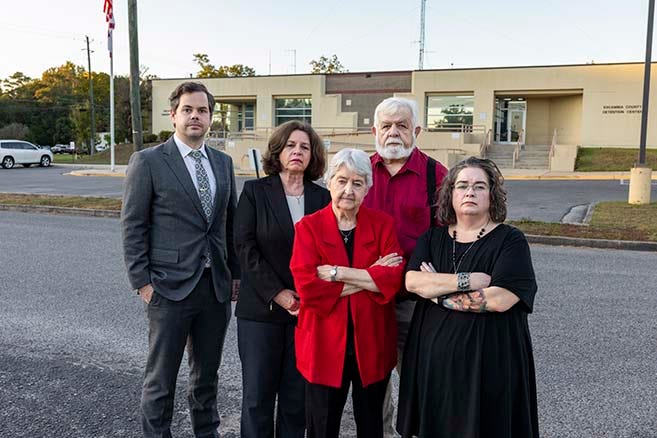The Alabama 'Atmore Four' Lawsuit Against School Board
The 'Atmore Four' where retaliated against for voting no on the school superintendent contract renewal, the media company and two school board members where unjustly arrested and emotional impact.
A local political dispute over whether to retain a school superintendent ended with two school-board members, the school’s payroll supervisor, and a local journalist in jail. None of them committed any crimes. But that didn’t stop Escambia County’s top law-enforcement officials from abusing their offices to punish anyone they thought stood in the way of extending the superintendent’s contract.
District Attorney Stephen Billy and Escambia County Sheriff Heath Jackson both took an unusual personal interest in School Superintendent Michele McClung’s tenure. The two men decided that they were the law in Escambia County, and opposing McClung was against the law. They openly threatened to retaliate against anyone who stood between them and four more years of McClung. And once the School Board—which includes Plaintiffs Sherry Digmon and Cindy Jackson—decided not to renew McClung’s contract, DA Billy and Sheriff Jackson made good on their threats.
With the help of several local officials, DA Billy and Sheriff Jackson planned and carried out a convoluted conspiracy of retaliation. The conspirators seized Cindy’s and Sherry’s cell phones for the crime of talking to each other about McClung. And they seized the phone of Plaintiff Ashley Fore (the school district’s payroll supervisor) without even bothering to get a warrant. Then, when Sherry’s newspaper, Atmore News, published a story by Plaintiff Don Fletcher about DA Billy’s interest in the School Board, the sheriff and district attorney kicked off a wave of arrests. Within days, they locked up Sherry, Don, and Ashley for revealing grand-jury secrets—even though there was no grand jury, Plaintiffs were not bound by any secrecy laws, and they were not privy to any secrets. In other words, it was all a sham. Over the next few weeks, they arrested Cindy, arrested Sherry again, and impeached Sherry to try to remove her from the Board.
It took almost four months and the School Board paying out the remainder of McClung’s contract before Billy finally admitted to the court that he had both personal and professional conflicts of interest in his cases against Plaintiffs—demonstrating that he had no business charging them to begin with. The Alabama Attorney General’s Office took over the prosecutions and promptly dropped all the charges. But for Plaintiffs, the damage was already done.
Americans must be able to participate in local government without fear that they’ll be branded political enemies, investigated, and punished for speaking their mind. Criticism isn’t criminal. Our Constitution ensures that government officials can’t use their authority to punish people who disagree with them about who should hold local office. The below video interviews the ‘Atmore Four’ explaining their journey from the beginning, being arrested and the painful emotional impact inflicted on the individuals.
Lawsuit Declared Relief
This lawsuit seeks to remedy the harm that Sherry, Ashley, Cindy, and Don suffered because DA Billy, Sheriff Jackson, and their allies conspired to violate Plaintiffs’ civil rights. Defendants arrested Plaintiffs and seized their phones without any legitimate basis to do so in retaliation for Sherry’s, Cindy’s, and Don’s protected speech. Their conduct violated the First and Fourth Amendments.
Plaintiffs respectfully request that Court provide relief by delaring that Defendants’ malicious, abusive, and retaliatory arrest of Sherry for malicious, abusive, and retaliatory Cindy, and Don, the seizure of Sherry and Cindy’s phones, and the impeachment of Sherry violated the First Amendment.
Declare that the Escambia County Sheriff’s Office’s official policies, practices, or custom of retaliating against political dissidents, as applied to Sherry, Cindy, and Don, violated the First Amendment.
Declare that the individual Defendants violated Plaintiffs’ Fourth Amendment rights by:
a. Knowingly, intentionally, or recklessly procuring and executing an invalid warrant to seize Cindy’s and Sherry’s cell phones unsupported by arguable probable cause, unlimited in scope, and unsupported by an oath or affirmation;
b. Knowingly, intentionally, or recklessly seizing and searching Ashley’s phone without a warrant, exigency, or probable cause; and
c. Knowingly, intentionally, or recklessly arresting and detaining Plaintiffs without arguable probable cause or any legitimate basis to believe that they’d committed any crimes.
Declare that the Escambia County Sheriff’s Office’s official policies, practices, or customs of seizing persons and property without probable cause, as applied to Plaintiffs, violated the Fourth Amendment. Award Plaintiffs compensatory and punitive damages in an amount in excess of $75,000 to be proven at trial, as well as nominal damages. And Plaintiffs attorneys’ fees, costs, and expenses.
In the United States, elected officials, citizens, and journalists must feel free to express differences of opinion. When those in power intimidate their opponents into silence, it strikes at the heart of American governance. But holding officials accountable when they violate basic constitutional rights can be nearly impossible, especially when they are law enforcers. A new Institute for Justice lawsuit seeks to change that. The Institute for Justice is a nonprofit, public interest law firm. Their mission is to end widespread abuses of government power and secure the constitutional rights that allow all Americans to pursue their dreams. Please consider a donation to Institute for Justice and help fight for all constitutional rights.





I hated public School. What a waste of property tax money. Shut it all down. Get real jobs. Public school was the biggest waste of time on top of being boring. Working at a public school is for people who have no real life skills. I learned more from my father just by watching. Gardening, building, drawing, some history, chess.